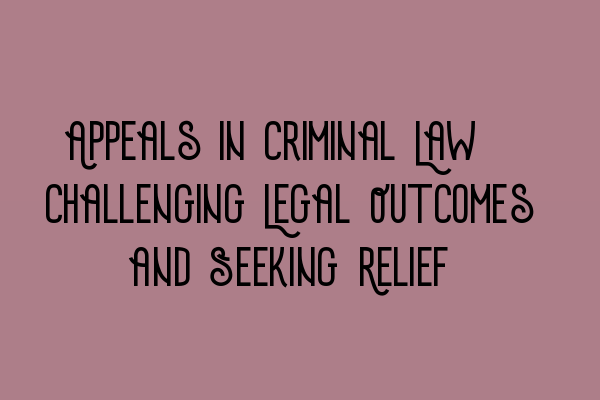Appeals in Criminal Law: Challenging Legal Outcomes and Seeking Relief
When it comes to the criminal justice system, the outcome of a legal case can have significant consequences for all parties involved. Whether you are the defendant or the prosecution, the decision made by the court can impact your rights, reputation, and future opportunities. However, it is important to remember that legal outcomes are not set in stone. In the event of an unfavorable decision, you have the right to challenge it through the appeals process.
Understanding the Appeals Process
Appeals in criminal law provide a channel for reviewing a case and seeking relief from an unjust outcome. The appeals process allows for a higher court to reexamine the evidence and legal arguments presented during the initial trial. By doing so, it aims to correct any legal errors or injustices that may have influenced the original decision. It is crucial to note that appeals are not an opportunity to retry the case or introduce new evidence.
Before initiating an appeal, it is essential to consult with an experienced criminal law solicitor who can guide you through the process. They will evaluate your case, identify potential grounds for appeal, and explain the likelihood of success. Remember, each case is unique, and the specific circumstances of your situation will determine the most suitable strategy for pursuing an appeal.
Grounds for Appeal
In criminal law, several grounds can serve as the basis for an appeal. Here are some common examples:
1. Legal Errors
If errors in interpreting or applying the law occurred during your trial, it can serve as a strong ground for appeal. This could include misdirections, incorrect legal standards, or improper admission or exclusion of evidence.
2. Procedural Irregularities
Procedural irregularities, such as a violation of your rights during the arrest, questioning, or trial process, can form the basis for an appeal. Breaches of procedural fairness could compromise the overall integrity of your case.
3. New Evidence
In exceptional circumstances, the discovery of new evidence that was not available during the original trial can warrant an appeal. This evidence must be relevant, credible, and capable of altering the original outcome.
4. Ineffective Assistance of Counsel
If you believe that your legal representation during the trial was inadequate and directly impacted the outcome, you may have grounds for an appeal. Ineffective assistance of counsel claims require demonstrating specific instances of incompetence or unethical behavior by your attorney.
The Appeals Process
Initiating an appeal requires diligent preparation, adherence to strict timelines, and submission of the necessary documents to the appropriate court. The appeals process typically involves the following stages:
1. Filing a Notice of Appeal
To begin the appeals process, you must file a notice of appeal within the specified time frame. Failing to meet the deadline can result in the forfeiture of your right to appeal.
2. Grounds of Appeal and Argument
In this stage, your solicitor will work with you to identify the grounds of appeal and construct a persuasive argument. This involves a thorough review of the trial record and legal research to support your appeal.
3. Preparing the Appeal Bundle
The appeal bundle consists of relevant documents from the initial trial, including the indictment, witness statements, and transcripts. This bundle is submitted to the appellate court for review.
4. Oral Hearing
Depending on the circumstances and court requirements, your appeal may involve an oral hearing. During the hearing, your solicitor will present your case, addressing the grounds of appeal and arguing for the desired outcome.
5. Court’s Decision
After considering all arguments, the appellate court will deliver its decision. They may uphold the original decision, overturn it, or order a retrial.
Conclusion
The appeals process in criminal law plays a critical role in ensuring justice and fairness for all parties involved. If you are dissatisfied with a legal outcome, exploring the possibility of an appeal is crucial. By consulting with an experienced criminal law solicitor, you can assess the merits of your case, identify grounds for appeal, and navigate the complicated appeals process with confidence.
At SQE Criminal Law & Practice Law UK, we understand the complexities of the appeals process and have a successful track record in handling criminal appeals. Contact us today for expert assistance in challenging legal outcomes and seeking the relief you deserve.
